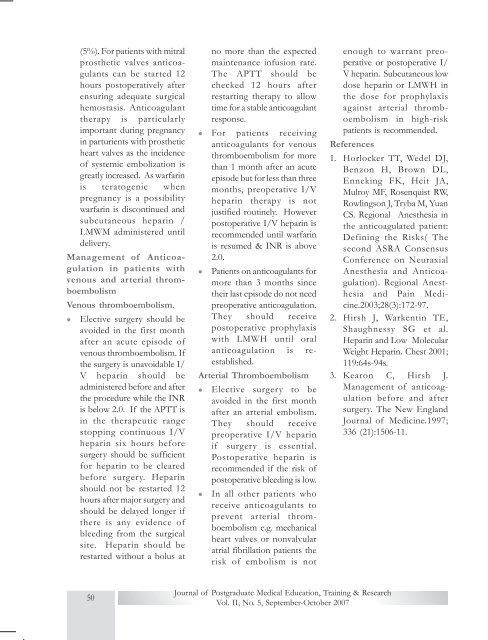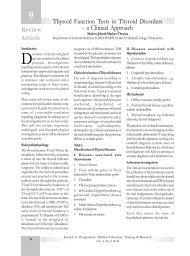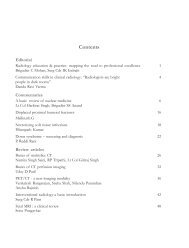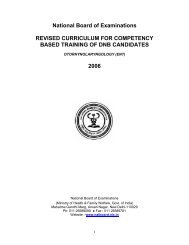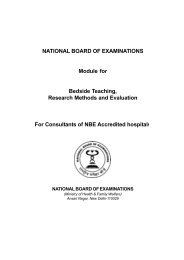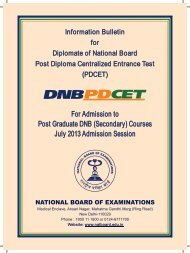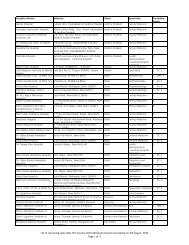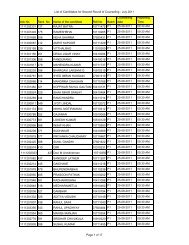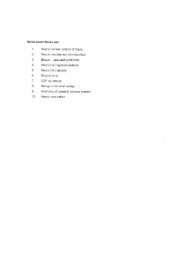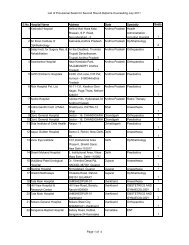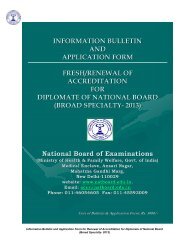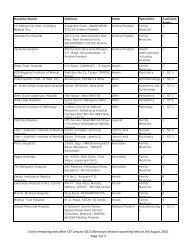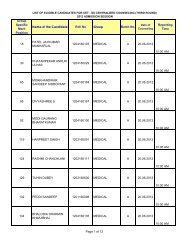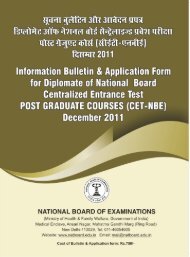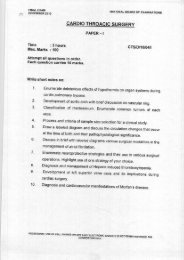National Board Ex- 6 Book .pmd - National Board Of Examination
National Board Ex- 6 Book .pmd - National Board Of Examination
National Board Ex- 6 Book .pmd - National Board Of Examination
Create successful ePaper yourself
Turn your PDF publications into a flip-book with our unique Google optimized e-Paper software.
(5%). For patients with mitralprosthetic valves anticoagulantscan be started 12hours postoperatively afterensuring adequate surgicalhemostasis. Anticoagulanttherapy is particularlyimportant during pregnancyin parturients with prostheticheart valves as the incidenceof systemic embolization isgreatly increased. As warfarinis teratogenic whenpregnancy is a possibilitywarfarin is discontinued andsubcutaneous heparin /LMWM administered untildelivery.Management of Anticoagulationin patients withvenous and arterial thromboembolismVenous thromboembolism.lElective surgery should beavoided in the first monthafter an acute episode ofvenous thromboembolism. Ifthe surgery is unavoidable I/V heparin should beadministered before and afterthe procedure while the INRis below 2.0. If the APTT isin the therapeutic rangestopping continuous I/Vheparin six hours beforesurgery should be sufficientfor heparin to be clearedbefore surgery. Heparinshould not be restarted 12hours after major surgery andshould be delayed longer ifthere is any evidence ofbleeding from the surgicalsite. Heparin should berestarted without a bolus atno more than the expectedmaintenance infusion rate.The APTT should bechecked 12 hours afterrestarting therapy to allowtime for a stable anticoagulantresponse.l For patients receivinganticoagulants for venousthromboembolism for morethan 1 month after an acuteepisode but for less than threemonths, preoperative I/Vheparin therapy is notjustified routinely. Howeverpostoperative I/V heparin isrecommended until warfarinis resumed & INR is above2.0.l Patients on anticoagulants formore than 3 months sincetheir last episode do not needpreoperative anticoagulation.They should receivepostoperative prophylaxiswith LMWH until oralanticoagulation is reestablished.Arterial Thromboembolisml Elective surgery to beavoided in the first monthafter an arterial embolism.They should receivepreoperative I/V heparinif surgery is essential.Postoperative heparin isrecommended if the risk ofpostoperative bleeding is low.l In all other patients whoreceive anticoagulants toprevent arterial thromboembolisme.g. mechanicalheart valves or nonvalvularatrial fibrillation patients therisk of embolism is notenough to warrant preoperativeor postoperative I/V heparin. Subcutaneous lowdose heparin or LMWH inthe dose for prophylaxisagainst arterial thromboembolismin high-riskpatients is recommended.References1. Horlocker TT, Wedel DJ,Benzon H, Brown DL,Enneking FK, Heit JA,Mulroy MF, Rosenquist RW,Rowlingson J, Tryba M, YuanCS. Regional Anesthesia inthe anticoagulated patient:Defining the Risks( Thesecond ASRA ConsensusConference on NeuraxialAnesthesia and Anticoagulation).Regional Anesthesiaand Pain Medicine.2003;28(3):172-97.2. Hirsh J, Warkentin TE,Shaughnessy SG et al.Heparin and Low MolecularWeight Heparin. Chest 2001;119:64s-94s.3. Kearon C, Hirsh J.Management of anticoagulationbefore and aftersurgery. The New EnglandJournal of Medicine.1997;336 (21):1506-11.50Journal of Postgraduate Medical Education, Training & ResearchVol. II, No. 5, September-October 2007


